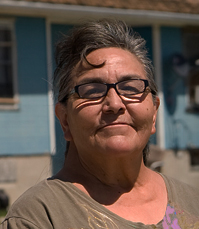|
|

 |
One of three famous children of the Omaha Principal Chief Joseph La Flesche, Susette La Flesche was a teacher, activist, author and lecturer. She was born in 1854 near Bellevue, Nebraska and attended the Presbyterian mission school on the Omaha Reservation. She studied art at the University of Nebraska and traveled with her father to Indian Territory to help provide medical attention to the Ponca. While there she met Standing Bear, Principal Chief of the Ponca tribe.
Standing Bear left Oklahoma in the winter of 1878 to return to his homeland and walked with his band for two months. When they arrived at the Omaha Reservation, the La Flesche family provided them food and shelter. The army came to the Omaha Reservation that spring to force Standing Bear to return to Oklahoma.
At the trial for Standing Bear (see Standing Bear), Susette testified for the Ponca and then wrote several articles about the case. The court’s decision was the first one acknowledging the human rights of Native Americans, and stated that Native Americans were free to choose where they wanted to live.
After the trial Susette and her brother Francis accompanied Standing Bear on a lecture tour to eastern cities pleading the case for a Ponca homeland. Susette and her brother interpreted for Standing Bear. Susette became a national celebrity known as “Bright Eyes” to the public. Also on the tour was a reporter from Omaha, Thomas H. Tibbles, who had helped ignite discussion in Congress about the case.
After the lecture tour was completed Susette and Thomas Tibbles married and continued their advocacy for Native American citizenship and the allotment of tribal lands to individuals. They believed it would be more difficult to take away an individual’s land than land owned by an Indian nation.
Susette and Thomas Tibbles continued to lecture and in 1886 toured England and Scotland. Together they wrote a book on the Wounded Knee massacre. The couple lived in Washington, D.C. for a period of time and lobbied Congress on behalf of the Omaha and the Ponca. Susette eventually returned to Nebraska and died in 1903. In 1994 Susette La Flesche was inducted into the National Women’s Hall of Fame. |
|
|















